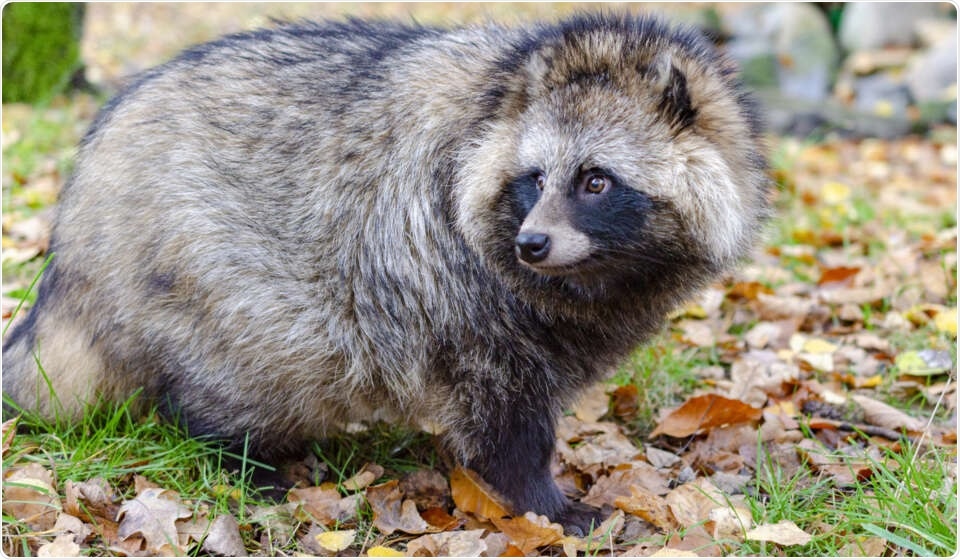For the first time, a research team from the LOEWE Centre for Translational Biodiversity Genomics (TBG) has sequenced the genome of a raccoon dog. Genetic data now supports the animal’s ability to spread SARS-CoV-2.

Being native to East Asia, raccoon dogs (Nyctereutes procyonoides) have spread widely over Europe. Image Credit: Senckenberg Research Institute and Natural History Museum.
Racoon dogs are native to East Asia and have spread extensively across Europe. They are presently listed as an invasive species in Germany. These animals are also closely associated with foxes and are known to harbor numerous viruses that can spread to humans.
The new study indicates that raccoon dogs may also be a reservoir host for SARS-CoV-2. The article has been published in Frontiers in Genetics, a scientific journal.
The raccoon dog is a host and vector for a variety of pathogens that can be dangerous to humans, their pets, and livestock. These include rabies and canine distemper virus. The raccoon dog is now widely distributed in Europe and will probably continue spreading. Analysing its genome, we know more now about its potential role in transmitting SARS-CoV-2.”
Dr Sven Klimpel, Professor, LOEWE TBG, Senckenberg Biodiversity and Climate Research Center
Dr Klimpel is also a Professor of Parasitology and Infection Biology from the Goethe University Frankfurt.
The genetic data, that is, DNA found in the cell nucleus, was obtained from the tissue and blood samples of a raccoon dog. It was found that the whole genome of the raccoon dog contains 2.39 billion nucleotide bases—the basic units of DNA strands.
Detailed analyses in laboratory settings and by using high-performance computers at LOEWE TBG disclosed the sites of genes and provided data on the proteins that might be produced based on them.
In the genome of the raccoon dog, we found the genes of two proteins that can be used by SARS-CoV-2 for binding at a cell. The genetic information showed that raccoon dogs are likely susceptible to SARS-COV-2 and that they can potentially transmit it to other animals.”
Markus Pfenninger, Professor and Molecular Ecologist, LOEWE TBG, Senckenberg Biodiversity and Climate Research Center
Pfenninger is also a Professor of Molecular Ecology at the University of Mainz.
The data also demonstrated that one of the membrane proteins in the raccoon dog attaches with higher affinity to the SARS-CoV-2 spike protein when compared to the membrane proteins found in their relatives, like wolves and foxes, and also compared to the ones found in Asian pangolins or bats.
Recently, bats and pangolins have been regarded as potential direct vectors of SARS-CoV-2 to humans. Which animal host transferred the coronavirus ultimately to humans is still unresolved. However, our study shows that the raccoon dog is a suitable reservoir host for the coronavirus.”
Dr Sven Klimpel, Professor, LOEWE TBG, the Senckenberg Biodiversity and Climate Research Center
Raccoon dog (Nyctereutes procyonoides) belongs to the species of dogs and is closely associated with foxes. This omnivorous animal looks like raccoons and was originally introduced to Europe for fur breeding and hunting, where they became prevalent in the 20th century.
As predators or competitors, raccoon dogs can disrupt the populations of native species, like ground-nesting birds. As disease vectors, raccoon dogs can pose a health risk to people who come into close contact with these animals.
Professor Klimpel is studying analogous risks of alien and invasive predator species in the project titled “Zoonotic and ecological effects on wildlife of invasive carnivores (ZOWIAC),” a collaborative project by Goethe University Frankfurt and the Senckenberg Society for Nature Research.
“The sequencing of the raccoon dog genome is just the beginning. We can now perform detailed analyses of how individual genes are related to the transmission of certain diseases. Our data can help to better understand the evolutionary history of dogs. For example, it is still unclear why the raccoon dog is the only canine species that hibernates,” concluded Klimpel.
The new genome data can now be accessed in online databases to support studies on this and analogous queries.
Source:
Journal reference:
Chueca, L. J., et al. (2021) De novo Genome Assembly of the Raccoon Dog (Nyctereutes procyonoides). Frontiers in Genetics. doi.org/10.3389/fgene.2021.658256.